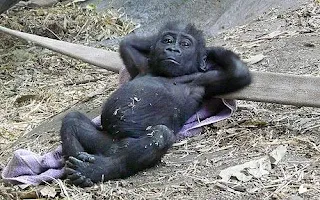Understanding something anew still gives me that little frisson of pleasure, not quite so thrilling as when I realised that, whilst all religions can't be right, they can certainly all be wrong, but pleasurable nevertheless.
One such little event happened a few minutes ago when I followed the link from a tweet promoting a book and read one of the readers' reviews. The book was Last Ape Standing: The Seven-Million-Year Story of How and Why We Survived by Chip Walter.
To me, one of the puzzles of human evolution was why humans evolved such high intelligence when none of our close relatives outside our immediate ancestral line did to the same degree, and why no other branch on the tree of life has come close to evolving anything like the same level as we have (though very many are probably sentient and even able to hold a conceptual model the world in their brains, but that's s different story).
One of the central ideas in evolution is how natural selection works on the potential for change and how quickly this potential is realised once it occurs. Evolution abounds with examples of a huge burst of diversification whenever a new capability arises by chance, for example, a central nervous system; movement onto land; 'discovery' of flight by insects, then birds; 'invention' of photosynthesis, etc., etc.
One such opportunity arose as a fortuitous by-product of human evolution - the evolution of bipedalism or upright walking. There are several theories about why we evolved bipedalism but one thing it involved was a modification of the pelvis to pivot the lumbar vertebra into a more upright position and to bring our centre of gravity in line with our legs. This introduced a curve into the female birth canal. Because of this curve, giving birth is a much more difficult process for humans than for almost all other mammals, including the other Great Apes, consequently, the loss of both mother and baby in child-birth was common before the advent of modern medicine and obstetrics techniques and still is throughout much of the under-developed world. So, we can be sure that bipedalism must have given us a huge advantage for it to be selected for despite this high rate of attrition.
But this high rate of attrition didn't go 'unnoticed' by evolution of course. It was an important part of the equation and one consequence of it was that human babies are born much earlier in their development than those of other apes because there was now an advantage in being small at birth, up to a point. As always with evolution by natural selection, it is the survivors which carry the genes for survival into the next generation whilst those with less advantageous genes tend to be eliminated.
Consequently human babies need a longer period of close parental care. Our children can't normally even walk for much of their first year on average (though some such as my youngest son can do so at nine months and others may take twice as long). In any comparison of the development of Human, Gorilla and Chimpanzee babies over their first few years, human babies appear to lag behind especially in the development of motor skills. And that was where we scored!
That long period of close parental attention created the opportunity for children to benefit from learning and assimilating knowledge and culture which in turn created the potential for a bigger brain to evolve because it could benefit from that potential for learning, and for language to develop and with it the huge explosion in human tool-making, culture, clothes, agriculture, cities, politics, economics and science. We can now pass on the whole of human experience and acquired knowledge to our children if they want to learn it and haven't been inculcated with a resistance to learning by priest who parasitise on our cultures and who would prefer we didn't learn too much or think for ourselves in case it threatens their power and privilege. It was all made possible by a fortuitous opportunity for evolution which arose as a consequence of the pelvic changes involved in the evolution of bipedalism.
The reason the other Great Apes have never evolved our level of intelligence and developed their cultures to the extent to which we have developed ours is because they have never benefited from evolving bipedalism to the extent to which we did. Consequently, their children are born more advanced and develop more quickly, simply because they remained in the forests whereas we either moved out into the plains of East Africa or, more likely, the African forests moved away from us because of climate change associated with continental drift. And because that happened, I can read a review of a book explaining how it happened and write a blog about it which you can now read almost anywhere in the world, even translated into many of the languages humans now speak because our cultures underwent an explosive diversification once the potential had been 'realised' by evolution.
Don't you just love the way the pieces of the jigsaw puzzle keep falling into place and building such a beautiful picture of this wonderful little planet?





No comments :
Post a Comment
Obscene, threatening or obnoxious messages, preaching, abuse and spam will be removed, as will anything by known Internet trolls and stalkers, by known sock-puppet accounts and anything not connected with the post,
A claim made without evidence can be dismissed without evidence. Remember: your opinion is not an established fact unless corroborated.